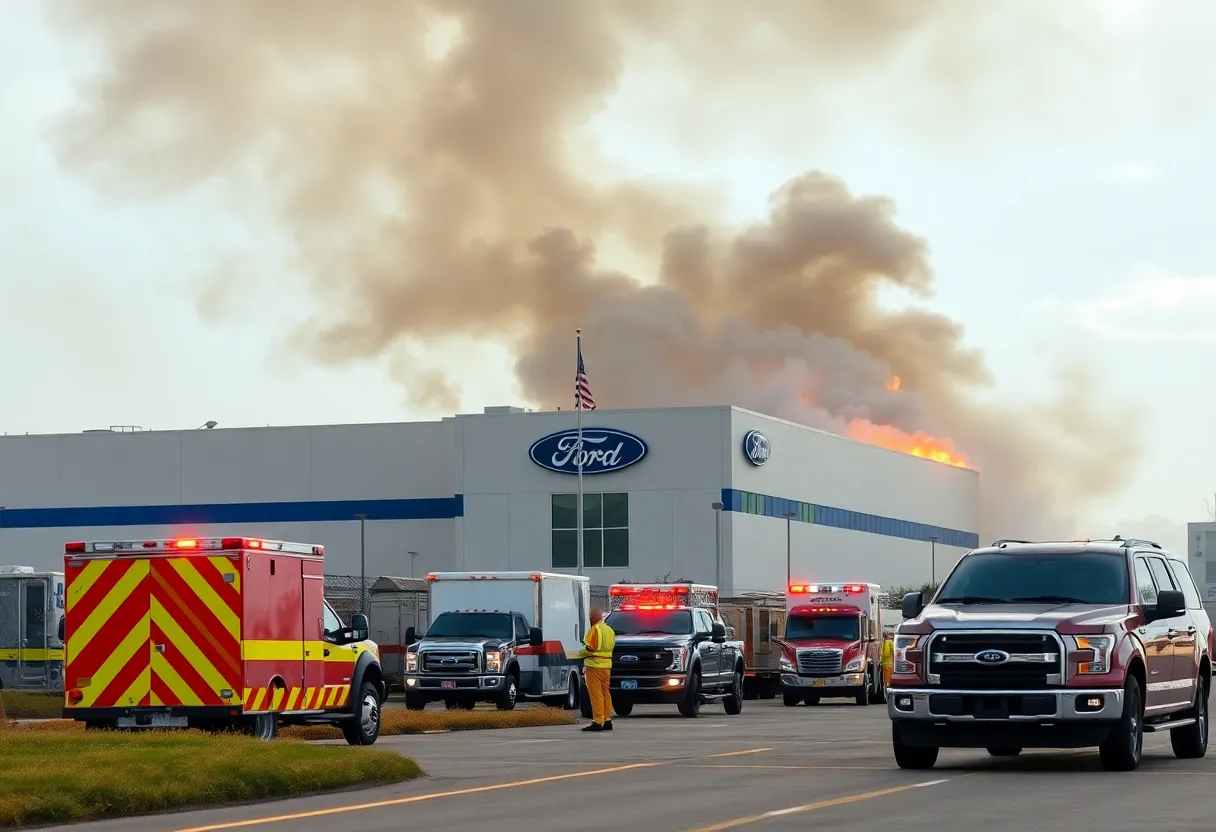Louisville KY, October 14, 2025
Ford has temporarily halted SUV production at its Kentucky Truck Plant following a fire at a crucial aluminum supplier, impacting models like the Explorer and Expedition. This disruption, expected to last two weeks, has led to hundreds of temporary layoffs. While Ford aims to mitigate long-term effects by sourcing from other suppliers, this incident underscores vulnerabilities in the automotive supply chain within Louisville’s economy.
Ford Halts SUV Production at Kentucky Truck Plant After Supplier Fire
Immediate Impact on Production and Workforce
Louisville, KY – Ford Motor Company has temporarily halted SUV production at its Kentucky Truck Plant due to a fire at a key aluminum supplier. The incident disrupted the supplier’s casting operations, directly affecting the manufacturing of popular models such as the Explorer and Expedition. This shutdown comes as a significant blow to the facility’s daily output, with hundreds of workers facing temporary layoffs as a result.
The fire, which occurred at the aluminum supplier’s facility, forced an immediate stop to the delivery of critical components to the Kentucky Truck Plant. Production lines for the affected SUV models have been idled, with the downtime expected to last approximately two weeks. Ford has stated that it anticipates minimal long-term effects on its overall operations by shifting sourcing to alternative facilities. However, the short-term disruption highlights vulnerabilities in the automotive supply chain, particularly for essential materials like aluminum used in vehicle bodies and frames.
Response and Mitigation Efforts
In response to the disruption, Ford is actively working to secure aluminum from other suppliers to minimize the halt’s duration. The company has rerouted resources to other plants capable of handling the overflow, ensuring that the broader production schedule remains as intact as possible. Union representatives, who represent the workers at the Kentucky Truck Plant, have emphasized the need for quick resolutions to limit the impact on employment and the local economy.
Workers affected by the temporary layoffs will receive support through Ford’s existing policies, including potential access to unemployment benefits and retraining programs if the downtime extends. The plant, a major hub for Ford’s truck and SUV assembly, typically operates with a workforce that powers the company’s heavy-duty vehicle segment. This incident underscores the interconnected nature of manufacturing, where a single supplier issue can ripple through the entire production process.
Broader Economic Context in Louisville
Louisville’s automotive sector plays a pivotal role in the region’s economy, employing thousands and contributing significantly to the area’s GDP. The Kentucky Truck Plant is one of the largest in Ford’s network, producing vehicles that are shipped nationwide and exported internationally. Any pause in operations draws close attention from local economic stakeholders, who monitor the situation for potential spillover effects on suppliers, logistics firms, and supporting industries.
The automotive industry in Louisville has long been a cornerstone of job creation and innovation. Facilities like the Kentucky Truck Plant not only assemble vehicles but also drive demand for local services, from parts fabrication to transportation. While this fire is an isolated event, it serves as a reminder of the sector’s reliance on a stable supply chain. Past disruptions, such as those during global chip shortages, have similarly tested the resilience of these operations, prompting ongoing investments in diversified sourcing.
Background on the Kentucky Truck Plant and Supply Chain Dynamics
The Kentucky Truck Plant, located on the outskirts of Louisville, has been operational since 1969 and is renowned for its capacity to produce high-volume trucks and SUVs. It handles assembly for models that represent a substantial portion of Ford’s sales, making it a critical asset. The plant’s integration into the national automotive ecosystem means that events like this supplier fire can influence production timelines beyond Kentucky.
Aluminum, a lightweight and durable metal, is essential for modern vehicle design, helping improve fuel efficiency and performance. Suppliers for such materials often operate specialized foundries where casting processes create the raw forms needed for automotive use. When fires or other accidents occur, the path to recovery involves not only repairs but also regulatory inspections and supply reallocations.
Historically, the automotive supply chain has faced challenges from natural disasters, labor disputes, and material shortages. Ford’s approach in this case aligns with industry practices, focusing on contingency planning to restore normalcy. As the situation develops, updates from the company will provide clearer insights into the resumption of full production.
The incident also prompts discussions on supply chain fortification. Experts in the field advocate for multi-supplier strategies to buffer against such risks. For Louisville, maintaining the momentum of its automotive sector remains a priority, with local leaders likely to engage in dialogues to support affected workers and businesses.
In summary, while the SUV production halt at the Kentucky Truck Plant is temporary, it illustrates the fragility and interconnectedness of modern manufacturing. Ford’s proactive measures aim to limit the damage, but the event will be closely watched for its lessons in resilience.
FAQ
What caused the production halt at Ford’s Kentucky Truck Plant?
A fire at an aluminum supplier disrupted casting operations, leading to the temporary halt of SUV production.
Which vehicle models are affected by this disruption?
Models like the Explorer and Expedition are affected by the production halt.
How long is the expected downtime for the plant?
The idling is expected to last for two weeks.
What is the impact on workers at the facility?
Temporary layoffs impact hundreds of workers at the Kentucky Truck Plant.
What measures is Ford taking to address the issue?
Ford anticipates minimal long-term effects and is sourcing alternatives from other facilities.
Why is this significant for Louisville’s economy?
Louisville’s automotive sector, a key economic driver, monitors the situation closely, as the plant supports jobs and related industries.
What role do union representatives play in this situation?
Union representatives seek swift resolutions to minimize disruptions in the supply chain.
Key Impact Chart
| Aspect | Details |
|---|---|
| Cause of Halt | Fire at aluminum supplier disrupting casting operations |
| Affected Models | Explorer and Expedition SUVs |
| Duration | Two weeks of idling |
| Workforce Impact | Hundreds of temporary layoffs |
| Ford’s Response | Sourcing alternatives from other facilities; minimal long-term effects anticipated |
| Local Relevance | Louisville’s automotive sector monitors closely as key economic driver |
| Union Involvement | Seeking swift resolutions for supply chain disruptions |
Deeper Dive: News & Info About This Topic
HERE Resources
Ford Expands Operations with $41 Million Land Purchase in Louisville





